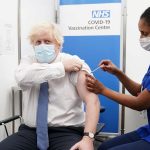Fully vaccinated Britons may be allowed to avoid quarantine on their return from international holidays.
Overseas holidays have been banned for many weeks due to the fear that people coming back will bring coronavirus variants home with them.
According to a report in The Daily Telegraph, those returning to the UK will be expected to have pre-departure COVID tests regardless of their vaccination status under plans from the government’s global travel taskforce.
But those who are fully vaccinated could need fewer tests after visiting low-risk countries and may avoid the 10-day quarantine on return from medium-risk countries.
It is understood the proposals would see all travellers entering the UK required to have a negative COVID-19 test before their departure, regardless of whether they have been vaccinated.
But their vaccination status is what would dictate what happens on their arrival in the UK and whether they have to quarantine.
It is expected that foreign travel will open up under a traffic light system which ranks countries red, amber or green according to their risk.
This risk would be decided based on vaccination levels, COVID-19 rates and the prevalence of variants in those countries.
Recent reports suggest travel to and from red-list countries will either be banned, or those arriving back in the UK from such destinations will have to pay to stay at quarantine hotels for up to 10 days, which is the current set-up for the worst affected countries.
The Telegraph quoted a source as saying that, for countries in the amber category, home quarantine could be removed, although there was debate on whether post-arrival testing would be required.
Those returning from green-listed countries would avoid quarantine.
The government’s Global Travel Taskforce is due to publish its report on how to restart non-essential foreign travel this month.
The report had been expected on 12 April but could now be as soon as this Monday, ahead of 17 May – the earliest date for overseas holidays being allowed.
Countries such as Greece and Croatia have already said they would offer vaccinated Britons summer holidays without quarantine or testing.
But holidays to other parts of Europe, such as France, Italy, and Germany, where leaders are tightening restrictions as their countries struggle with slow vaccination take-up and a surge in cases, might take longer to return to the list of popular holiday destinations.
A number of countries outside Europe are also likely to be off the holiday list for a while – Pakistan, Kenya, Bangladesh and the Philippines will be added to England’s coronavirus “red list” from 4am on Friday, 9 April.
This means international visitors who have departed from or transited through these countries in the previous 10 days will be barred from entering Britain, while British and Irish citizens or those with residence rights in the UK will have to pay to stay at a government-approved quarantine hotel for 10 days.
Among those to have made submissions to the Global Travel Taskforce about how holidays should resume is Heathrow Airport.
It quoted data from Oxera/Edge Health showing that testing could control the risk posed by overseas travel and also replace self-isolation rules.
The data concluded that many antigen tests reduce the number of infectious days of an international arrival by 63%, meaning that the risk of community transmission from a single test is comparable, if not more effective, to a 10-day quarantine period with no testing, which screens 62% of infectious days.
Heathrow’s chief executive John Holland-Kaye said: “The UK’s progress in the global vaccine race coupled with advances in testing, means that ministers no longer need to choose between public health and the economy – a risk-based approach to international travel will allow us to protect them both.
“Restarting trade and travel to key markets like the US after 17 May will be key to the government achieving its Global Britain ambitions and helping communities across the UK to level up.”
A spokesperson for the Department for Transport said: “The government’s objective is to see a safe and sustainable return to international travel, for business and pleasure.
“The Secretary of State for Transport is leading a successor to the Global Travel Taskforce to develop a framework that can facilitate greater travel when the time is right, while still managing the risk from imported cases and variants.”






















